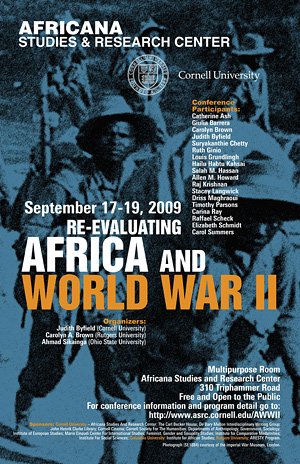Africana studies at 40: Pioneering center looks back, ahead
By Daniel Aloi

Cornell's Africana Studies and Research Center (ASRC) is marking its 40th anniversary with public events celebrating its history and achievements, while considering the foundations and future of the Africana field it pioneered.
The center's commemorations will include a Johnson Museum exhibition opening in October and a symposium Oct. 17 on the origins and institutionalization of Africana and the black studies movement, and ASRC's impact on them. The events, including a conference held last week on Africa and World War II, will also help the center reconnect with alumni and former faculty.
An independent, transdisciplinary unit, ASRC encompasses the study of African, African-American and African diaspora peoples, history, culture and ideas. The center produces publications, sponsors outreach and hosts prominent authors and scholars.
ASRC is offering 40 undergraduate and graduate-level courses this semester and 47 courses in spring 2010, many of them cross-listed with other departments. Seventeen undergraduate courses are new this year, "with a balance of social sciences and humanities," says Salah Hassan, ASRC director since 2005.
The center has forged many academic ties across campus since its inception in 1969, when its course credits were accepted in four Cornell colleges. "We have very productive scholars doing interdisciplinary work, [and] we've always included people who work in more than one area," Hassan says.
ASRC has 11 dedicated faculty members, four lecturers and visiting scholar Ushari Khalil from Sudan. It is approaching a gender balance in hiring, with four "highly engaged" women faculty members, Hassan says, "and also an intellectual balance, with appointments in the social sciences, in cultural studies, and the arts and humanities."
The center underwent an external review after a critical self-study in 2008 and established an advisory council of prominent scholars from outside Cornell to guide implementation of the review's recommendations.
The center's recent accomplishments and initiatives in its five-year plan for growth and development include:
- Recruitment of senior faculty, with five new hires since 2008: associate professor of African-American literature Riché Richardson, an artist and a cultural envoy to Paris in early 2009; cultural studies theorist Grant Farred, editor of South Atlantic Quarterly; historian Judith Byfield, vice president of the African Studies Association; gender theorist Carole Boyce Davies, who helped build the African Diaspora Program at Florida International University; and sociologist Travis Lars Gosa, who specializes in hip-hop, African-American youth culture and education.
- Development of an accredited Ph.D. program in African and African-American studies that the Graduate School is currently considering.
- An African languages curriculum. ASRC has added Yoruba and Zulu, and offers Kiswahili (taught at Cornell for 35 years) and Arabic (in collaboration with Near Eastern Studies), plus one-to-one instruction in other languages when needed.
- Linkages to African universities. The center co-sponsored two joint conferences in 2007 and 2008 with Addis Ababa University, one at Cornell on modernity and monarchy in Ethiopia, and one in Addis Ababa on Darfur and crisis of governance in Sudan. Cornell University Press recently published a critical reader from the Darfur conference, co-edited by Hassan and Carina Ray, Ph.D. '07. A volume from the Ethiopia conference is forthcoming. ASRC is also pursuing a study abroad program with the assistance of professor emerita Anne Adams, who directs the W.E.B. Du Bois Center in Ghana.
- Formation of an advisory council that will include Africana alumni.
"We've expanded the notion of what academia can look like," Hassan says. "We remain socially and intellectually engaged, and we want to remain connected to issues of concern to African-Americans and the global African community."
The center remains committed, he adds, to having well-trained students who reflect all demographic sectors at Cornell.
"We shape our program with a specific theme and focus, and think of the job market, but we also position them in the traditional disciplines in a way that they can succeed," Hassan says.
Media Contact
Sabina Lee
Get Cornell news delivered right to your inbox.
Subscribe